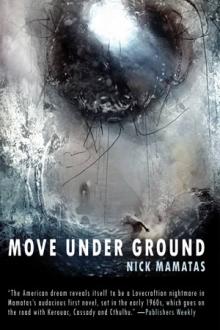Move Under Ground by Nick Mamatas (guided reading books .txt) 📕

- Author: Nick Mamatas
- Performer: 0809556731
Book online «Move Under Ground by Nick Mamatas (guided reading books .txt) 📕». Author Nick Mamatas
I had the spaghetti with meat sauce and loved it. I loved it like I loved Hoboken and all these slimy little lives in the shadow of the haunted skyscrapers across the gray river. At least they were human! Even Squarehead, even the Negro who relieved himself against the balding tires of our truck, even the squinty-eyed Mongoloid kids who chewed lead like candy never sold their souls for some dubious starry wisdom. Death filled the spoiled air in Hoboken, but it was a natural death, the death of attachment, the death of fill-in-the-blank. I could feel a balloon over my head, tethered to my own mortality, whenever I turned to the east and saw the city on the opposite shore. We spent a week in Hoboken, plotting. Gathering intelligence.
We held court every night in the diner, after spending our days wandering the few streets here to find our fellows. The beatniks had already been chased out of the West Village, their apartments torn to shreds by bankers driven insane by Cthulhu-tainted money. Some had been to the city, wading through the dark and flooded Hudson tubes—the trains stopped running weeks ago. Others took rafts at dawn and paddled across the Hudson to see what was what, or chugged up north then walked across the George Washington Bridge.
“We’re invisible,” a girl with kohl-stained eyes told me over tea and reefer. “Like a hand in a beehive, if you don’t bother them, they don’t notice you. Not these mad mindless cultists. They walk the streets in robes, ten abreast.” She didn’t smile, it was like those muscles had been pulled from her face. She wouldn’t smile if you tickled her feet or hugged her tight and told you you loved her. She wouldn’t smile if you meant it.
“There are mundanes too—you’ll see them when you go ashore. They sit by their windows, an eye peeking out between the ribbons of their blinds, waiting for their world to return.” She took a long drag and then said wistfully, “I wonder if anyone has starved to death yet. Cats eat their dead owners, you know. They only wait a few hours to do it. With a dog, they’ll sit there and watch a corpse, whimpering and waiting to be fed. Cats get hungry.”
This girl was a serious head. I just now noticed that for as good-looking as she was (ironed hair, dainty nose, sweet round chin), near everyone else in the room had given her five feet of leeway in every direction. They crowded in the corner to talk to Bill, or hung out by the door.
“Are you a cat or a dog, old Jack?” she asked me and before I could give her a witty answer, she cocked her head, peered at me with those black and rounded eyes and said, “You’re a cat person. That’s good, I don’t want to get too attached to someone who is going to die soon.” She leaned forward, took the back of my head in the palm of her hand and kissed me like a man would. Heck, she kissed me like I kissed so many girls with her haircut and a tenth of her brain. We spent the night together in some moth-eaten sleeping bag in a broom closet while Bill did the brain work with the gang outside. Just as well, my heart wasn’t in this adventure anymore.
In the morning after the kohl-eyed girl skulked off looking like a raccoon, I poured a cup of coffee (Where was I? Some artist’s loft? Everyone else had split anyway) and stepped outside onto the roof and saw Manhattan again. I poured the coffee out (caffeine is a drug—I needed to be utterly straight) and settled down onto the tar beach to meditate so that I might peer beyond the purple veil of haunted smog that rested over the island like a shawl on some withered old lady’s shoulders.
In the reflection of the new glass and steel buildings, in the shadow of old baroque bones, I saw it. The deus ex machina. Manhattan was it, the God of the machine, pumping out horror after horror. Every postmark on stamps meant for Big Sur, all the lucky train cars and sloshing tanks of gas, all to drag me across the country without just giving up to the drunk or to the sweaty arms of some girl (I could still smell the kohl-eyed one on me, on my neck and fingers, she was unripe like a March peach). Cross-country travel wasn’t even that hard, really. Neal was there to tear up the landscape in Denver, sweet and convenient beer there to deaden my senses from the madness of the skies in Kansas. We kicked through challenges like bathroom doors but it was all thanks to deus ex machina_; _ the unexpected yank of a lever, the dark man with his gun, the party gone on just a minute too long.
Another realization in a month of realizations: it needed me. Whatever it was, whatever sinister force was the real Prime Mover of all this clockwork grue (Cthulhu, the shoggoths, they were mere shadows on the wall of this cave, I knew), to the almighty It, little Ti Jean had cosmic significance. Have enlightenment, will travel.
I struggled to detach myself from the marionette strings of self, to dance free and off the beaten path, but it lead me right back to my buzzing morning thoughts. Was it September yet? It was warm, but not so hot as summer. Rivers had a cooling effect on nearby land, like bodhisattva’s smile on a crowded battlefield. The cuts grew kinder. I found myself wishing for my Underwood so I could write Neal a letter about all these crazy times, the realization between syllables of haiku, but then I remembered that he probably knew all this stuff already. He always lived life on a string, but he was no holy fool; Neal Cassady was a cosmic dupe.
The systems for planning always fail. Everything, anything, we all fall to dust at the end of the day. That’s why I never cared if any of my trips across the ribboned highway of America ever made it all the way; you can’t succeed for failing anyway. Denver, Frisco, a hot couch in New Orleans, drippy automat New York, it’s all the same, nothing but “Here I am!”
With a steel and concrete scraping, Maxwell’s on Washington started up again. It didn’t take five minutes for the smell of coffee grounds to sweep up the street like a hobo’s blanket. I was agitated suddenly, up from half-lotus and pacing. Guns? Bug spray? The force of Buddha’s palm? Caffeine was in the air and it tasted like war on my tongue and sweaty skin. The poetry of war, and me without a typewriter or even a chewed up pencil behind my ear. Bill was probably up now. He was always an early riser—a bizarre habit for a junky fag—I went to collect him so that together we could strike at the dark heart of America’s nightmare.
The skinny Puerto Rican grinned and held out his bony Charon hand. The little outboard motor was already belching blue smoke, ready to push us hard across the river. We paid him with grass wrapped in butcher paper and he smiled and nodded. “Amigos, amigos! You’re trusting men, strong boys I can tell. But I’m not coming back for you, I’m not going to wait for you either. If you get back, you get back on your own.” He sat astern, opened the paper and starting running his finger through the weed, looking for seeds and stems, and didn’t help us aboard. I jumped for it then held out a hand for Bill, who was weighed down by two huge containers of bug spray strapped to his back. We had that, I had a butcher knife tucked into my work boot with a spare sock wrapped around the blade, and I had woken up with a feeling that the stars were right. That’s what we had. “And you swim the last twenty yards, I’m not going to moor either.”
I swam in the Hudson once, back when the river was still blue with tiny teardrop waves goading me on, back when even the fog was a warm embrace and leaves spilled from the parks of Washington Heights and floated under the docks. Even then as a stupid college kid I could feel my eyes burn whenever I dunked my head. Now the river was black and had an almost solid topography; our old Charon swung and moved the rudder to avoid hunks of steaming waste the size of couches.
And it wasn’t the cult that did this, the filth here was all natural, all man. We had everything already, the altar had been laid out, sacrifices prepared. Charnel pits in Europe, hills of dead babies, bombs that could take this city of money changing temples out in a flash of light; the concrete and steel wouldn’t even last long enough to crumble down to the ground. We’re all so rich now that we’re one step away from holding out the begging bowl and blinking away hungry flies. How could the elder gods resist such a morsel—we’d stuck the decorative toothpick in ourselves.
I turned back to look at Charon. He had a firm grip on the outboard’s rudder and a deep smile. Bill sat across the bow, tilting forward to keep the cans from pulling him overboard and into the brown wake. “There is no way we can swim twenty feet in this filth, much less twenty yards. And we have the tanks to carry,” I said. Bill said “Yeah. We have a better chance of hopping across the shitty little islands. This is like sailing through a goddamn rectum.”
“That’s right. So you’re taking us to shore, or we’ll just knock you right off your own motorboat and let you swim half a mile back to Jersey.” Hoboken life was really starting to grow on me, or maybe it was the fecund stink of the world rotting around us. Charon laughed, one of those proud American laughs, and said “What an idea! I had the same.” He pulled a pistol, a shiny little dame in a noir flick keeps me in her handbag number, right out of his pocket and leveled it at me. “You two, empty your pockets and jump. Better the river than the lead, no?” Bill shrugged out of one of the shoulder straps of his tanks and got the gun in his face instead, “No, you keep that. Just everything else you have. This isn’t a cheap trip junky—you can’t take nothing else with you.”
I didn’t have a thing in my pockets and turned them inside out to show him, “We’re just wandering fools, you know. Looking to save the world a bit?” Bill grunted, his face granite. “I’ll drown with these things on.” For a second I considered rushing the guy—maybe Bill was on the same wavelength. His junky body was tense suddenly, all the reserve morphine pooled up in his muscles had been burned out by adrenaline and fear. But he emptied his pockets with a futile defiance. He





Comments (0)